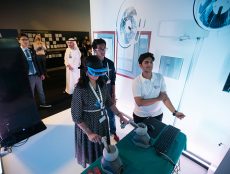
As Generation Z — those born after 1996 — prepares to enter the workforce, they have many challenges ahead of them. This future generation is job hunting amidst a global pandemic, when the world’s economy is struggling to recover and the job market is tight. It has never been more important for universities to supply their graduates with every possible skill and advantage to give them a competitive edge and a leg up in their early career. One critical piece of this preparedness puzzle? Soft skills. Employers demand them, and experts say there’s a growing gap in the soft skills one needs to be successful in the workforce, and the skills students actually enter the workforce with. Universities have a unique and important role to play in bridging this soft skills gap.
A Tallo Survey Suggests Gen Z Is Aware of the Soft Skills Gap
First off, it’s important to note that the problem is not a lack of awareness on Gen Z’s part. In a recent Tallo survey of over 2,400 Gen Z students, 92% reported that they are able to confidently identify which soft skills they have. What’s more, they know that soft skills are critical to their success in the workplace. When we asked Gen Zers if they believed that soft skills or hard skills are more important for success in the current economy, nearly three-quarters chose soft skills, such as critical thinking, analysis, problem solving, leadership, and communication.
LinkedIn CEO @jeffweiner says the largest professional skills gap right now is in the area of soft skills – the stuff robots can't do yet. https://t.co/92EUorzCNO pic.twitter.com/MZMh5u4RKu
— Vala Afshar (@ValaAfshar) November 15, 2020
Since awareness of soft skills isn’t an issue, universities should instead focus on helping Gen Zers translate those skills they’ve developed as students into soft skills that will be attractive for potential employers. Until this happens, there will always be a soft skills gap. We all know the infamous interview questions that employers are likely to ask during the application process: How do you work in a team setting? How do you demonstrate leadership? What is your communication and problem-solving style? These questions may be intimidating to Gen Zers who have never held a full-time job before. To remedy this and build their confidence, one step universities can take is to help their students understand how the soft skills they’re developing in class and during school projects will translate to their future role in the workforce. For example, the critical thinking abilities students develop while taking tests and completing group projects are exactly what future employers want them to utilize on the job.
How Universities Can Help Graduates Bridge the Gap
In order to maximize a student’s skills development, it’s important for mentors and faculty members to meet Generation Z where they’re at. We asked Gen Z about their preferences for developing their soft skills in our recent Tallo survey, and the number one method was by “stepping outside of their comfort zone.” However, they are not fond of developing their skills by merely observing others — that was at the very bottom of their preferences list. Universities can embrace this willingness to try new things and an enthusiasm for diving into the unknown by facilitating interactive, hands-on skills training. It’s clear that Gen Zers will respond better to active skills development over a more passive method.
As universities help Gen Z students translate their abilities into employable soft skills, they must remember to highlight the strengths that are unique to this youngest generation. We asked Gen Z students which new soft skill they’ve developed during the pandemic, and nearly half (46%) selected adaptability. Rather than being completely overwhelmed by the circumstances of the past year, the future generation has harnessed those challenges into developing a new strength that will serve them well as they enter the workforce.
An Uphill Battle
Despite these unique advantages, Generation Z will likely need to work harder to disprove the misconception with older generations in the workforce that their comfort level with technology has caused an inability to develop interpersonal relationships. Some experts state that an overuse and over-reliance of technology on Gen Z’s part has contributed to the skills gap, but Generation Z disagrees. When we asked, 72% of Gen Z said they don’t believe technology has weakened their ability to maintain strong interpersonal relationships or develop people skills. Universities have the chance to help Gen Z showcase their ability to develop interpersonal relationships, a critical skill that should be transferable from school to the workplace. Combined with their unique position as digital natives, this can be a very attractive combination for potential employers.
In short, universities are well positioned to minimize the soft skills gap and set their students up for success in their future careers. University is a time of concentrated growth for most students, and Generation Z is ready and willing to challenge themselves and step outside of their comfort zone to better position themselves in today’s difficult job market. The key for universities is to instill confidence in the skills that Gen Zers have already developed, teach them to transfer those from the classroom to the workplace, and provide direction for how to seek out training for any skills they lack.
Casey Welch is the co-founder and CEO of Tallo.
Featured Image: The Creative Exchange, Unsplash.








No Comments